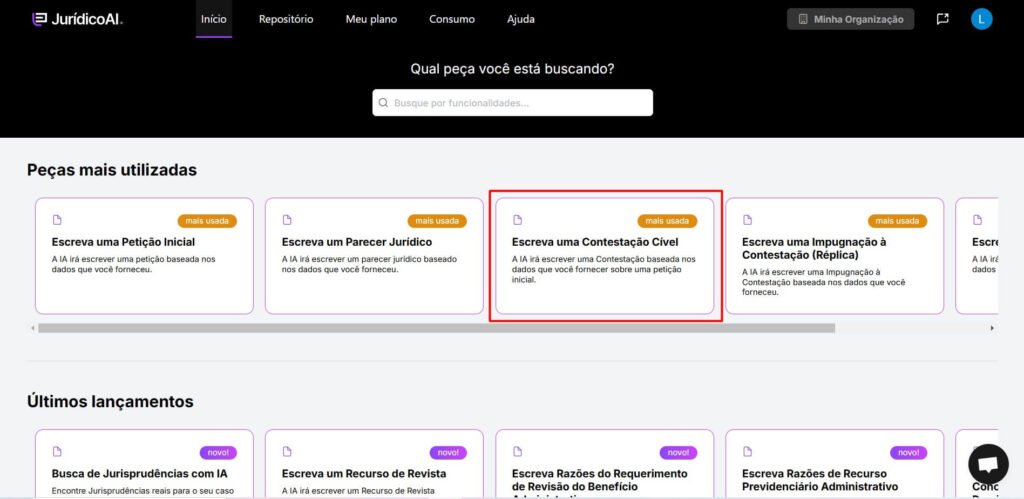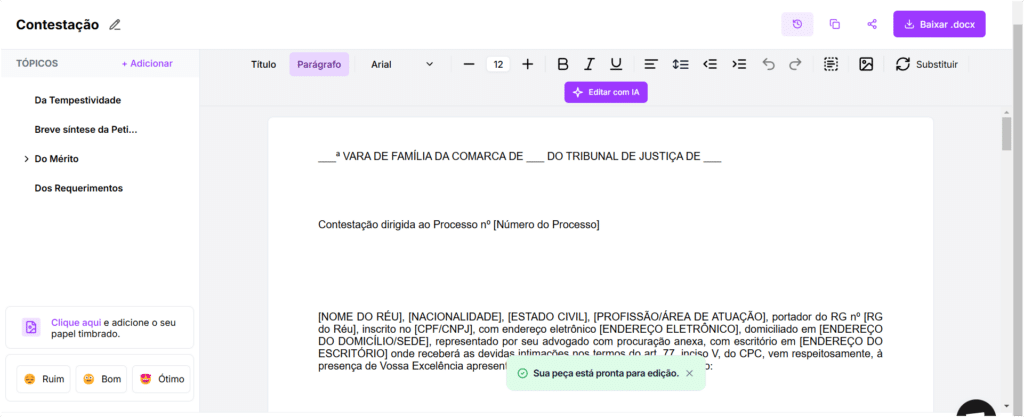Challenging a food revision with a reduction request is essential for a strong and effective defense.
We create a comprehensive model to streamline this procedure, offering a thorough and evidence-based answer to legal requests.
The Legal AI team focused on developing a thorough model for food review challenges to offer a swift and precise solution during legal disputes.
If you want to safeguard your customers’ rights and interests during alimony review efficiently and with technical expertise, we are prepared to assist you in this procedure.
Introducing our Monitoring Action model!
Model for revising quotations by reducing pensions.
I’m sorry, but it seems like you forgot to provide the text that needs to be paraphrased. Please provide the text so I can help you paraphrase it.
Quotation directed to the case under [Case Number]
[Food Name], registered in the [CPF], a minor represented by [Representative Name], [Nationality], [Civil State], [Profession], enrolled in the CPF under the [CPF] with the email address [ELETRONIC DERETION], residing at [SEREO DOMICLIO office] 77, incise V of the CPC, respectfully appears before you in accordance with Article 335 of the same Code.
Contest
Facing a Revisional Action involving a decrease in the pension of the foreign national, the process under the number [Process Number] initiated by [AUTHOME], a [NACIONALITY], [CIVIL STATE], [PROFESSION/AREA OF ACTIVITY], holding RG number [RGEN] and registered under CPF/CNPJ, with an email address of [DEREORE].
Storminess
In line with Article 335 of the New CPC, which stipulates that the dispute can last for a maximum of 15 working days following the initial period [date of initial period], this action is being promptly processed and officially recorded on [Protocol date].
Summary of the Initial Request
The author, employed under the Consolidation of Labor Laws (CLT), is seeking to reduce the 30% of their net income currently allocated for child support payments, stating that a recent significant wage reduction has made the obligation unsustainable and compromising their ability to cover basic expenses.
The writer argues that, while meeting the food obligation, adhering to the fixed percentage significantly impacts their dignity and survival. They also point out that the minor’s parent is currently in a better financial situation, which should be taken into account to maintain a balanced parental obligation. Furthermore, they request Free Justice assistance due to financial constraints in handling procedural costs without jeopardizing their livelihood.
The Contestation aims to rebut the author’s arguments by highlighting the truth of the facts, particularly concerning the analysis of the necessity-possibility contrast and the proportionality of the food obligation. It seeks to show that the author’s arguments lack sufficient justification for the proposed reduction, and emphasizes that the food obligation should be evaluated based on the best interest of the child, who is the ultimate beneficiary of the food distribution.
It is a concise summary of what is required.
The Merit
Insufficient evidence exists to support providing free legal services.
Article 98 of the Code of Civil Procedure states that Free Justice assistance is only available to individuals who can provide clear evidence of financial hardship preventing them from covering legal expenses without affecting their livelihood. In this particular situation, the author has only presented payslips showing a decrease in wages, which alone is insufficient to prove the claimed financial incapacity.
The author is fully compliant with the food obligation, showing financial stability and ability to meet higher-impact commitments, contradicting claims of absolute economic hardship. Compliance with the food obligation, even after a wage reduction, indicates no harm to subsistence, suggesting financial stability that does not warrant the desired benefit.
The lack of solid evidence of the author’s claimed financial incapacity, along with his continued fulfillment of major obligations, indicates the rejection of his plea for justice. Trying to obtain this benefit without meeting legal requirements is considered a misuse of the system and should be denied to maintain procedural fairness and proper adherence to the law.
The lack of significant and unexpected fluctuations in financial ability.
Article 1.699 of the Civil Code states that alimony revision is contingent upon showing a substantial change in the financial circumstances of the parties involved, which the author has not adequately demonstrated in this instance.
While a decrease in wages is noted, it is not considered a significant or unforeseen change that would warrant altering the fixed percentage. The author continues to meet their food obligation despite the income reduction, indicating that it has not impacted their ability to fulfill the requirement as specified.
The call for a review is rooted in general assertions of financial struggles, without clear evidence that their basic needs and dignity are actually at stake.
The procedural good faith principle, outlined in Article 5 of the Civil Procedure Code, mandates that parties must provide precise, factual, and adequate evidence to support their claims. Nonetheless, the author’s evidence is limited to showing pay stubs reflecting a salary cut, without demonstrating how this decline affects their ability to fulfill the food obligation or jeopardizes their basic needs significantly.
There is no solid proof showing that it is impossible to sustain the existing pension without affecting your essential requirements. The lack of conclusive evidence regarding the supposed financial disparity hinders the positive consideration of your appeals.
The focus should be on considering the child’s best interests when evaluating food requirements, ensuring that their development and well-being are not compromised by unnecessary changes in the percentage allocated.
The proposed request to revise the alimony should be considered unwise due to the lack of significant evidence of economic changes or personal impairment affecting the author’s subsistence or dignity.
The Genitora’s financial situation is not important for the one-sided evaluation.
Article 1.694 of the Civil Code requires parents to provide financial support for their child based on their financial capabilities, and does not allow one parent to unilaterally change the alimony amount without significant proof of changed circumstances.
The author’s request for a revision is primarily based on a claimed wage decrease, but lacks strong evidence that this change affects meeting the food obligation. The attached pay stubs, while indicating a drop in income, are not sufficient on their own to support the 30% reduction in alimony. It is important to note that the author is still employed under the Consolidation of Labor Laws (CLT), ensuring a steady income and indicating the ability to meet the obligation.
The son-in-law of the minor is not being given more financial responsibility because there is no proof that he is in better economic circumstances. The author failed to show any evidence of a substantial change in the parent’s financial situation to warrant a change in the food support allocation.
The child, as the ultimate beneficiary of the child support, should have all their needs fully provided for, without the provider trying to lessen their contribution based on assumptions about the other parent’s financial situation.
The author’s request for a revision of alimony lacks evidence and goes against the principle of family solidarity by trying to shift the responsibility of the child’s support solely onto the other parent. Maintaining the current fixed percentage is necessary to meet the child’s needs in accordance with constitutional and legal principles. Therefore, the author’s arguments are insufficient to decrease the alimony amount.
The absence of conditions for granting early tutelage.
Early protection according to Article 300 of the Civil Procedure Code necessitates both the likelihood of the right and the risk of harm to the process’s outcome. In this instance, the author failed to prove the likelihood of the right supporting the alimony review claim.
A basic statement of financial commitment without supporting evidence of its sustainability does not fulfill the necessary probability criteria for the claim.
The author has fulfilled the food obligation as stated in the initial petition, and there is no evidence of inadmissibility or imminent harm justifying the urgency of the requested measure. Compliance with the obligation so far does not interfere with meeting basic needs. The author has not shown clearly that their financial situation affects their dignity or ability to fulfill other responsibilities.
The author’s arguments do not have the necessary legal and evidential backing to fulfill the legal prerequisites for obtaining early protection. The lack of specific evidence showing the likelihood of the claim being valid and the risk of irreparable harm renders the request clearly baseless and should be turned down to uphold the legality and fairness of the legal process.
The lack of convincing evidence of changes in the binary necessity-possibility.
Article 1.699 of the Civil Code requires a significant change in financial circumstances for a food review to be considered. In this case, the author did not prove a sufficient decrease in their ability to contribute to justify the revision. While showing evidence of a salary reduction, it is not enough to demonstrate a substantial change in financial circumstances. Additionally, the author has remained current with the food obligation, indicating that their livelihood was not solely dependent on fulfilling this obligation.
The author failed to provide specific evidence showing that keeping the current alimony percentage would endanger their basic needs or lead to financial hardship. Simply claiming financial difficulty is not sufficient to justify changing the alimony amount, especially without proving the inability to cover other essential expenses.
A decrease in income does not necessarily indicate a significant change in the ability to provide for one’s dependents. This should be evaluated considering the unaltered needs of those being supported, which must be given priority as per legal provisions.
The author’s request to reduce alimony based on his financial situation not improving is unfounded. Concrete evidence of inability to meet obligations is required to consider a change. The minor’s best interest and the current legal order support maintaining the existing alimony percentage.
Requirements
Based on the information provided and the documents referenced, the current objection is to ask for the following requests.
- The author’s requests are completely rejected while keeping the current food prices unchanged.
- The author was ordered to pay the attorneys’ fees of the subcommittee.
- All evidence accepted by the law must be produced, if needed.
Ask for respect in this context.
City and state.
Lawyer/Bar Association
To learn more about the Quotation, visit:
Guide on Quotation Worker: Definition and Function
Prohibition Interdict Action Quote Template [Full]
Paternity Research Computing Model [Fully Developed]
Model for Claiming Moral Damages [Full]
Quotation within the Cobra Action [Model]
Food Action [Model] Quotation
Use legal artificial intelligence to quickly reduce complete sections.
When requesting a reduction in pension during a review of food-related matters, it is important to use a strategic approach to show that there are no valid reasons to change the previously determined amount.
It is crucial to demonstrate that there has been no significant change in the financial capacity of the provider to justify a review, and that the feeding requirements either remain the same or have increased.
The argument should rely on pertinent written proof and legal precedent, highlighting the importance of maintaining the pension as it is now.
Legal AI provides a practical solution for lawyers looking to improve efficiency and speed in creating legal documents.
Our AI is ideal for legal professionals, enabling them to efficiently generate contracts, petitions, notices, and opinions with precision and current information.
The primary advantages of utilizing our artificial intelligence for attorneys are as follows:
- Generate organized minutes quickly and accurately to speed up the drafting of procedural parts.
- Artificial intelligence customizes the writing based on the case’s context to maintain a coherent and tailored argument to meet specific requirements.
- The platform stays up to date with new court decisions and laws to make sure your documents are always following the latest legal requirements.
- By automating the production of parts, you can free up more time to focus on strategy and customer service.
Creating a challenge in a revisional action with a pension reduction in Legal AI involves following a series of steps.
Creating a quote for revising pension reduction in Legal AI is quick and easy. Simply complete the form with your details and get your legal document within minutes.
Access the Legal AI website and sign up for an account if you do not have one yet. If you already have an account, simply log in with your credentials.

After logging in, choose “Compose a Quote” to begin creating the document.

Provide the vital information of the procedure, including the action number, author and defendant details, and the court handling the case.
Include the necessary details of the competition, such as:
- Procedural matters that may impact the advancement of the case.
- The author’s request for a pension review is summarized, including the rationale behind it.
- Defense reasons: Presenting arguments against the feasibility or sufficiency of reducing pensions using documents and evidence.
- Attached documents are required as proof of financial capacity and necessity for feeding.
- Ask the judge to reject the request for a pension reduction.


Review the theses generated in Step 5, make any needed changes, and choose the appropriate precedents on the platform to ensure your contest is well-organized before creating the final document.

Click the “Generate Document” button.

Step 6: The contestation in a revisional action regarding pension reduction, completed with the assistance of artificial intelligence, is now prepared for submission.

To ensure that Legal AI technology can effectively handle legal documents, it is crucial to offer thorough details about the case, particularly the events leading up to the court decision.
By inputting the information accurately and clearly, you will guarantee that your AI-generated task is personalized and legally more precise and efficient!
Don’t forget to also explore our tutorial available in the question center!
What benefits does our AI offer for attorneys?
- Decreases the drafting time for procedural sections by providing a solution that generates well-organized minutes quickly.
- Our artificial intelligence tailors the writing based on the specifics of the request, ensuring a solid argumentation by considering the context of the case.
- The platform is up to date with the latest legal developments to ensure that your components comply with current legislation.
- Automating the creation of legal documents allows you to concentrate on case strategy and customer service, a concept known as Strategic Time Leveraging.


